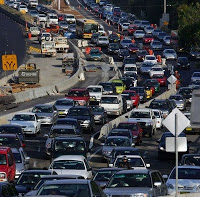Say this about Governor Bob McDonnell’s plan to scrap the gasoline tax and substitute a sales tax to fund transportation: Virginia has plenty of company around the country when it come to abandoning the user-pays principle. Americans apparently consider free roads, bridges and highways as an inalienable birth right — right up there with Medicare, Social Security, cheap mortgages, subsidized college tuition loans and the entire array of middle-class entitlements.
According to the Tax Foundation, state and local governments raised $37 billion in motor fuel taxes and $12 billion in tolls and non-fuel taxes, but spent $155 billion on highways. This, state user fees covered about 32% of total highway expenses. (Important caveat: Tax Foundation numbers include federal spending, most of which is funded by a gas tax, in spending figures but not in the state user-fee numbers.)
The ratios vary somewhat for other transportation modes, all of which rely upon a combination of user fees and subsidies. Air transportation was least dependent upon subsidies, at 22%. Transit relied the most upon subsidies, about 78%.
Virginia does not stray far from the national average. User fees (not including the federal gas tax) cover only 31.5% of road and highway spending and 39.8% of all transportation spending. By eliminating about $900 million a year in gasoline taxes, the McDonnell tax plan would largely sever any connection between how much people drive and how much they pay to maintain and grow the state road network.
Why is this a bad thing? For anyone conversant with economics, the value of user fees is self evident. I shall try to make the logic clear. People should pay the cost of the goods and services they consume unless there is a compelling public policy justification to do otherwise. If people get something for less than it costs, they demand more of it than they would otherwise. In the case of roads, that demand leads to an incremental increase in travel, traffic congestion and higher costs imposed indirectly upon the driving public in the form of gasoline consumed, vehicle depreciation and lost time.
Mark Burris with the Texas A&M Transportation Institute has said that eliminating the 17.5-cent-per-gallon gasoline tax would increase the number of miles driven in Virginia might by about 1.25%. That’s enough to add measurable stress to the transportation system — there’s a multiplier effect in which a one-percent increase in traffic will lead to two or three percent increase in congestion — but not enough to materially improve economic opportunity or the quality of life.
If schools, why not roads? Proponents of subsidies for roads use the analogy of the K-12 schools system. We subsidize schools, why not roads? Here’s why: A significant percentage of the population could not afford schooling if it were not free. The social spillover benefits of educating lower- and middle-income Americans so they can participate in the workforce — greater economic productivity, higher incomes, more taxes paid — is vast. Indeed, a modern economy cannot function without an educated workforce. By contrast, eliminating the gas tax will not suddenly make automobiles affordable for millions of people who do not now own cars — a few, perhaps, but not many. That’s because gasoline taxes represent a relatively small fraction of the total cost of automobile ownership. And even if it did, the economic benefit of subsidizing more automobile travel is incremental at best.
Everybody benefits from roads. Then there’s the argument that roads are necessary for commerce, therefore, everyone benefits whether they drive, walk, ride a bike, take the bus or work at home. Your employer probably benefits from having roads, goes this line of logic, so you benefit indirectly. Goods are cheaper at the store, so, if you buy stuff, you benefit indirectly.
By this reasoning, why not make roads totally free for everyone, including heavy trucks, which are directly engaged in commerce? After all, everybody benefits. The reason is that it would sent distorted price signals that lead to inefficient behavior, diverting containers from rail or barge, for instance, to trucks. Likewise, making roads free for commuters changes their economic calculus, leading to more driving and less walking, biking, ride sharing that otherwise. Electricity helps our economy function, too, but we don’t charge less than it costs. Likewise, Internet access greases the wheels of commerce, but we don’t give it away for free either.
We subsidize transit, why not cars? This may be the worst argument of all. We do subsidize transit, and transit operations constitute a running sore on the public fisc. (Just ask the Washington Metropolitan Area Transit Authority where it expects to raise $10 billion or more to replace depreciated track, stations and rolling stock!) We desperately need to find a fiscally sustainable model for transit. But as long as we subsidize cars, defenders of the transit status quo will respond with “We subsidize cars, why not subsidize transit” as an excuse not to reform. The solution is for all transportation modes to absorb their full costs so society can make rational choices, not to make the true costs opaque for everybody.
The argument that we subsidize X, therefore, why not Y, is a creeping sickness permeating our entire economy, justifying the mis-allocation of trillions of dollars. And look where it’s leading us. We’re deeper than ever in debt and economy is more sluggish than any time in U.S. history. This pernicious thinking simply must change.



